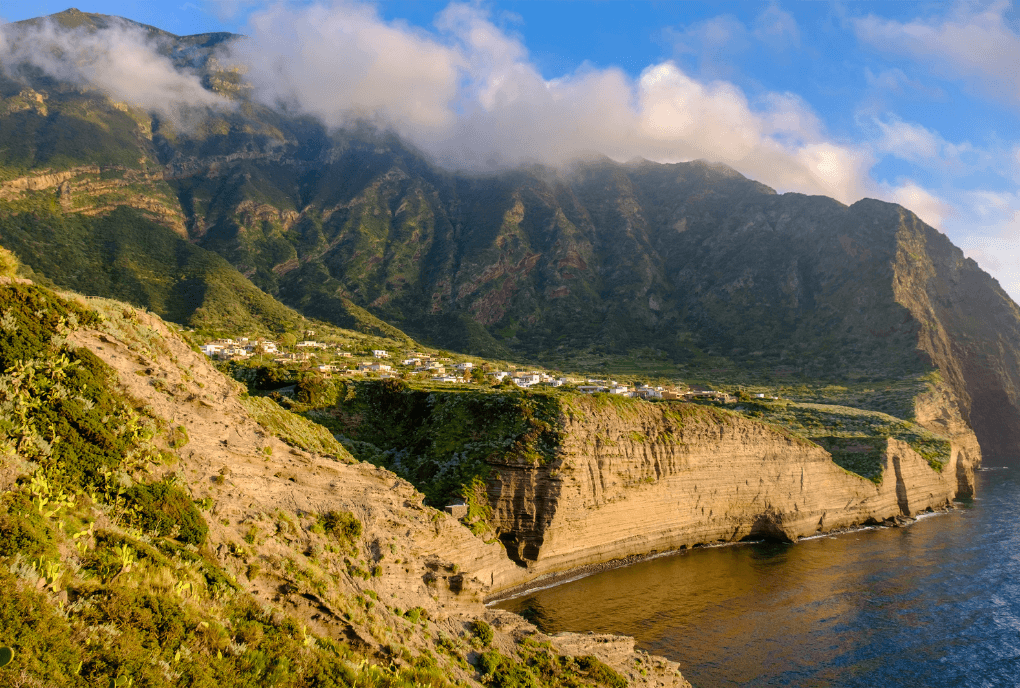
Salina. On the lips of the heart, beyond the tide
Keepers of winds, legends and inexhaustible sources of beauty, the Aeolian Islands remain a constantly evolving reality. Abodes of unspoiled nature and a way of life that makes contemplation of places its cornerstone. The following column has no explanatory purpose in the strict sense; it aims to make those who will read travel not only in space, but mainly in the soul of these suspended places, between sea and sky.
Island
Of you love attracts me,
My land, if dark scents
Loses the evening of orange trees,
Or oleander, serene,
walks with roses the creek
That almost touches its mouth.
But if I return to your shores
and sweet voice to the song
calls from fearful street
I don’t know whether childhood or love,
Anxiety of other heavens turns me,
And I hide in the lost things.
Salvatore Quasimodo, Submerged Oboe, Edizioni di Circoli, Genoa, 1932 (in. All Poems, Oscar Mondadori Editore, 1995)
Getting lost in Quasimodo’s words. Or Simply at a specific time or place. The penultimate leg of this journey that began together, so, almost by chance, takes us once again through traditions, love and endless landscapes.
On the shores of a place little known to most, so darned unchanged by time as to be one of a kind.
Almost like that faded memory, which although no longer vivid, retains its essence and beauty.
Salina is reminiscent of that lost island, that vanished Continent: the primordial, unspoiled nature, the oxen and sheep grazing against the backdrop of the sea, the extinct volcano, the expanses of vineyards and capers that fade into the distance, the churches in the middle of the countryside, the narrow, cramped road, the small white houses with columns and canopies and bunches of tomatoes hanging on the walls, the palm trees reaching up to the sky and the Moto Bees carrying everything.
The name comes from a coastal pond that was once used precisely as a “salt pond.”
“Try walking on the shore to the bay, looking around you.” So replied Pablo Neruda to Mario Ruoppolo, the Postman who wanted to learn from the Chilean poet the art of writing love verses; sighs and trembles turned into words and phrases, to win a woman’s heart. Letters in exchange for poetry, this is the moving barter suggested to the cinematic genius of Massimo Troisi by Antonio Skàrmeta’s novel, “Ardente Paciencia.” Languid and sensual verses, sometimes bold, whispered by the shore, entrusted to the placid waves that beat on the coast of Pollara, an enchanted corner of the island of Salina. The most shy of the Aeolian islands, but also the most sensual: the Greeks called it Didyme, from the Greek word for twins, because of the double profile on the horizon of its twin volcanoes, which resemble the full forms of a female breast. A fertile and welcoming Mater Terra; a green island, rich in fresh water and forests, chestnut trees, poplars and other Mediterranean-scented species.
Getting lost. In the sunset of Pollara, a tiny village of stone houses in the rock, where the red sky meets Alicudi and Filicudi in the distance.
Feel the infinite, talk about the smell of the sea, orange blossoms, jasmine, broom, capers, grapes, olives, colors.
And then take that ship, which takes everyone away every day. Nostalgia and Detachment, Fear and Wonder, a melancholy happiness that makes one live life and think of another. As if the soul lacks something, that essence, that comes directly from that distant land that everyone welcomes and no one lets go.
And the thought can do nothing but return to Her. On the lips of the heart, beyond the tide, in the direction of Salina.
by James Gandola
The trip to the Aeolian Islands, accompanied by Giacomo Gandola, also took us to discover other islands, soak here: Stromboli, Alicudi, Vulcano , Filicudi, Panarea and finally to Lipari.
And if you can’t wait to visit them, book your tour with Charter Aeolian by clicking here.





